| |
Asia-Pacific Post
November 2024 |
|

|
| |
| |
What empowerment means
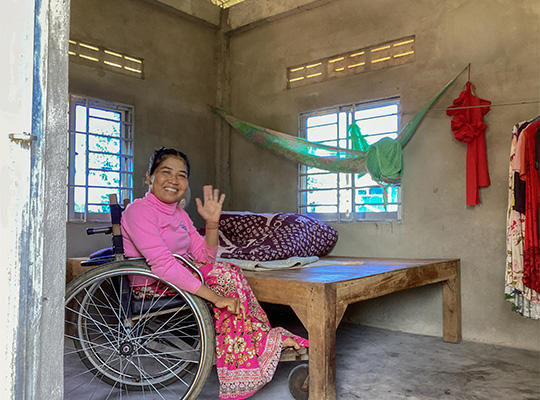
Sina in her accesible home. Photo: Habitat for Humanity Cambodia/Sorng Bunna.
|
Greetings in the new year! The year just gone could have been good or bad. But safe, adequate and sustainable housing remains central. In Cambodia, new homeowner Sina said, “What makes this house special is not just its physical structure; it symbolizes hope and a new beginning for me. Being consulted on the design elements that cater to my specific needs has been empowering." NEWS
Toward health and resilience
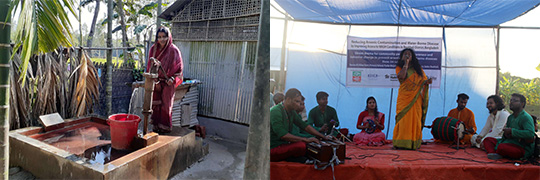 Residents in Kurigram, Bangladesh, can access safe water (left) while folk songs were used to reinforce proper hygienic practices. Photos by Habitat for Humanity Bangladesh. Residents in Kurigram, Bangladesh, can access safe water (left) while folk songs were used to reinforce proper hygienic practices. Photos by Habitat for Humanity Bangladesh.
|
In flood-prone Kurigram district, Habitat Bangladesh's multi-year project has provided more than 121,000 people with access to clean water and safe sanitation. Besides building local capacity and sustainability, girls and women were also empowered through various training. The project is highlighted in FuturArc, a green design magazine focusing on architecture and construction. Read an excerpt or subscribe (30-day free access to FuturArc digital magazine) to read the full article. Housing — the path to a climate-safe future
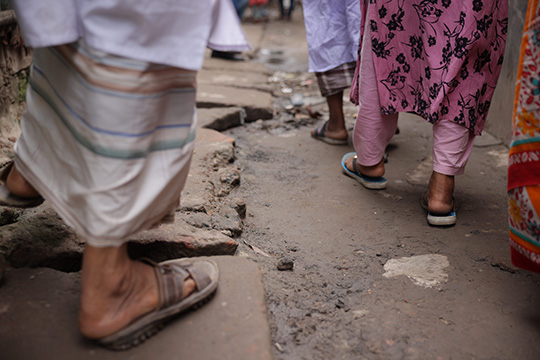
Residents walking through Beguntila informal settlement in Bangladesh's capital city Dhaka. Photo: Habitat for Humanity International/Raymond McCrea Jones.
|
Adequate, sustainable housing holds the key to building a climate-safe future and improving individual and societal well-being. In his article for the World Economic Forum, Habitat for Humanity’s CEO Jonathan Reckford calls for investing in the upgrading and greening of informal settlements that is among key strategies. Separately, James Samuel, interim national director of Habitat for Humanity India, shares why housing is the bedrock of individual and collective well-being. Learn more.Our footprint in Asia-Pacific
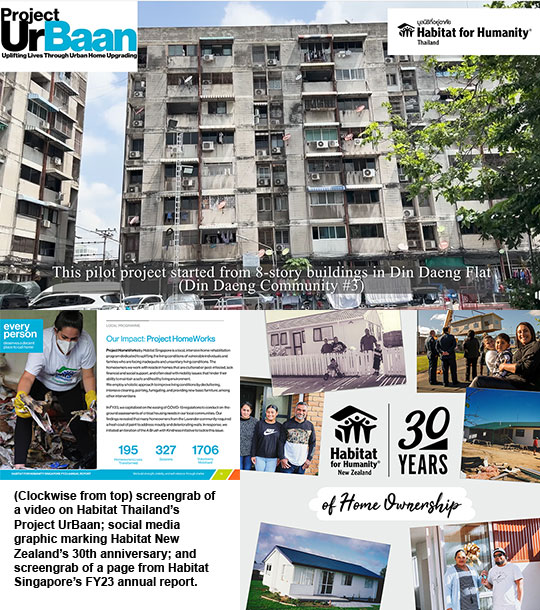
|
At its 25th anniversary in December 2023, Habitat for Humanity Thailand launched Project UrBaan together with the National Housing Authority. The project aims to improve the living conditions of people with disability, older people and female-headed households residing in Din Daeng flats. Built over 50 years ago, these apartments are not suited to these residents’ needs. Habitat Thailand also upgraded the building's entrance to facilitate the use of stretchers and wheelchairs. In the Pacific, Habitat New Zealand has marked three decades of partnering with people to provide safe and decent housing. Join them in doing more. Meanwhile, learn how Habitat Singapore engages volunteers to help households improve living conditions and more in their latest annual report. Homing in on empty spaces
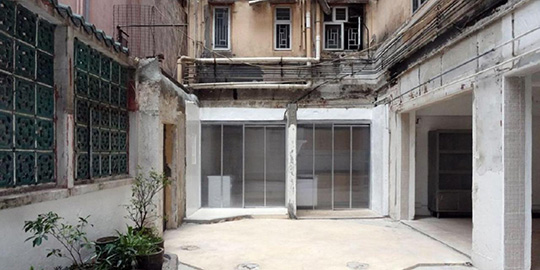 A vacant building in Hong Kong was converted for multiple uses in a pilot project. A vacant building in Hong Kong was converted for multiple uses in a pilot project.
|
Reviving empty spaces can help increase the adequate housing stock, particularly in Hong Kong where about 220,000 people live in tiny subdivided flats. In a 2022 pilot project, Habitat for Humanity Hong Kong and the University of Hong Kong worked with developers to convert four floors of a vacant building in the city’s Jordan neighborhood into an 8,000-square-foot community center and emergency shelter. The converted space operated for six months and served as a prototype for scaling up. Local nonprofits used the center to hold mental health workshops, organize food distribution and provide temporary housing, among other activities.
YOUTH INITIATIVES
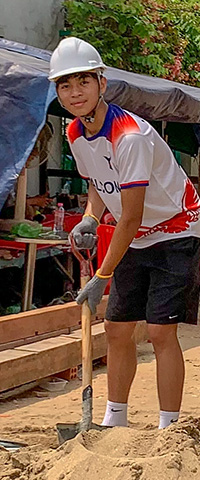
Jerhuy working at a build site in Cambodia.
|
Habitat Young Leaders Build: the largest youth movement in the Asia-Pacific region continues to make an impact through passionate supporters. “I want to take meaningful action in helping build and strengthen the community, leaving behind a positive impact on those who are less privileged,” said Jerhuy Shen-Puoy, an international school student who volunteered in Cambodia. Currently in its 13 th year, Habitat for Humanity’s Young Leaders Build rallies youth to speak up, raise funds and build homes together with families in need of adequate housing. Youth Solutions Micro-grant: we are pleased to announce the winners of the 2023 Youth Solutions Micro-grant that was part of Habitat's Asia-Pacific Youth Assembly. Each winner will receive a US$2,000 grant to start, replicate, or scale up their solution to address housing and urban challenges. They are expected to share more at a learning session in February. Register to join the online session.
- Gajahlah Kebersihan, Indonesia: in remote coastal areas, plastic waste will be turned into affordable, lightweight ventilation blocks. Local communities will be mobilized and empowered based on circular economy principles.
- Project Bazaar, India: a centralized system will provide real-time socioeconomic and environmental data on informal settlements in the country. The information can be used by the public and private sectors to monitor projects and improve basic services.
- The Modern Balsa, Philippines: lightweight, resilient floating houses will be built to help indigenous communities in Agusan del Sur province to address water scarcity, inadequate sanitation facilities and climate change-related threats.
- Team Nexa, India: with straw panels made of crop waste, an innovative structure provides housing for temporary workers in India’s informal settlements. The collapsible structure can be reused.
- Youth for Good Nepal: through workshops on earthquake-resistant retrofitting, local communities will learn how to make their homes more resilient against earthquakes, protecting lives and property.
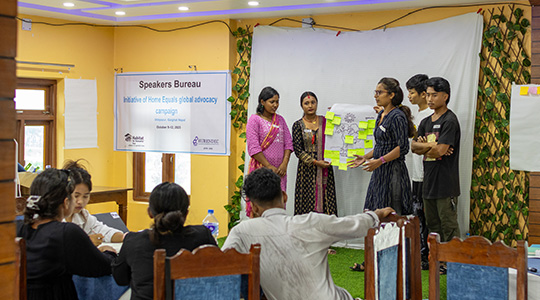 Youth participants learned about the housing gap in informal settlements, security of tenure, and broader impacts of housing as well as young people's role in leading change. Youth participants learned about the housing gap in informal settlements, security of tenure, and broader impacts of housing as well as young people's role in leading change.
|
We are the champions: following pilot training in October 2023, Nepali youth have become housing advocates. They were trained through an initiative under Habitat’s global advocacy campaign Home Equals. A group of young people in Triyuga municipality in eastern Nepal conducted a survey of informal settlement residents. Then they organized an activity to raise people's awareness of their rights and access to adequate housing and secure land tenure. Their efforts were supported by Habitat for Humanity Nepal and the Human Rights and Environment Development Center. DISASTER RESPONSEHelping quake-hit families to keep warm
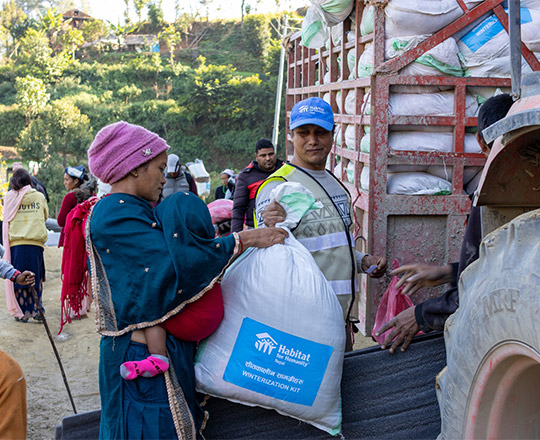
Vulnerable groups such as mothers with young children were prioritized during the distribution of winterization kits. Photo: Habitat for Humanity Nepal/Abisek Bista.
|
About 800 earthquake-affected families in Nepal received essential supplies last month amid freezing temperatures. Habitat Nepal had provided about 400 emergency shelter kits and other support after a 6.4-magnitude earthquake hit Jajarkot in November 2023. Rebuilding homes and lives in Tonga
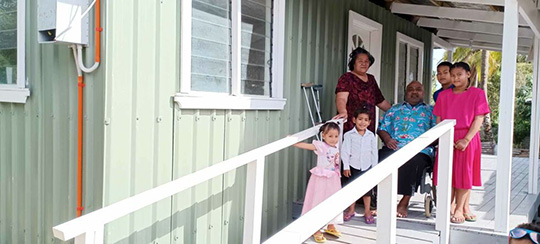
Sione finds it easier to move around in a wheelchair at his new home.
|
Sione's family is among eight families who partnered with Habitat for Humanity New Zealand to rebuild their homes on higher ground following the Hunga Tonga-Hunga Ha’apai earthquake and tsunami in January 2022. Besides cyclone-strapping techniques, Habitat New Zealand considered weather resistance in home construction to help the families prepare for harsh weather.
We appreciate your support for Habitat and the people from all walks of life who partner with us. Please invite others to subscribe for more updates and stories.

|
|
|
| |
|
|